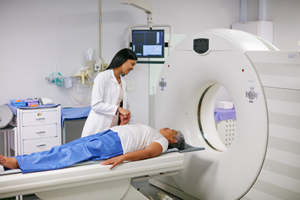 Last month, we provided an overview of the different types of imaging scans you may receive if you have MBC. We now continue with a deeper dive into each scan, including what they are for and how and why they are being studied in clinical trials. Participating in a clinical trial that is studying imaging scans may be an opportunity to get a scan you might otherwise not get because of considerations such as insurance or a non-standard use for the scan.
Last month, we provided an overview of the different types of imaging scans you may receive if you have MBC. We now continue with a deeper dive into each scan, including what they are for and how and why they are being studied in clinical trials. Participating in a clinical trial that is studying imaging scans may be an opportunity to get a scan you might otherwise not get because of considerations such as insurance or a non-standard use for the scan.
We start with MRI scans, also called magnetic resonance imaging. An MRI scan produces pictures of the body that are created by using magnetic energy rather than x-ray energy. MRI scans are most useful for seeing metastasis in the brain and spinal cord and sometimes the liver. Read below to find out more about what an MRI scan is, what it is used for in MBC, and for clinical trials studying MRI scans in people with MBC.
Introduction to MRI Scans
- American Society for Clinical Oncology: An MRI scan uses magnets to create detailed images of the body
MRI Scans for People with MBC
- Cancer Network: People with HER2+ MBC who received radiation to the brain for brain metastasis may receive an MRI scan to see how well the radiation worked
- OncLive (article and video): Although guidelines do not call for doctors to screen patients with MBC without neurological symptoms, doctors may request a brain MRI scan, and clinical trials are studying the usefulness of brain MRI to screen patients without symptoms
MBC Clinical Trials
- Metastatic Trial Search: Trials for Imaging Scans
Last Modified on July 1, 2024
